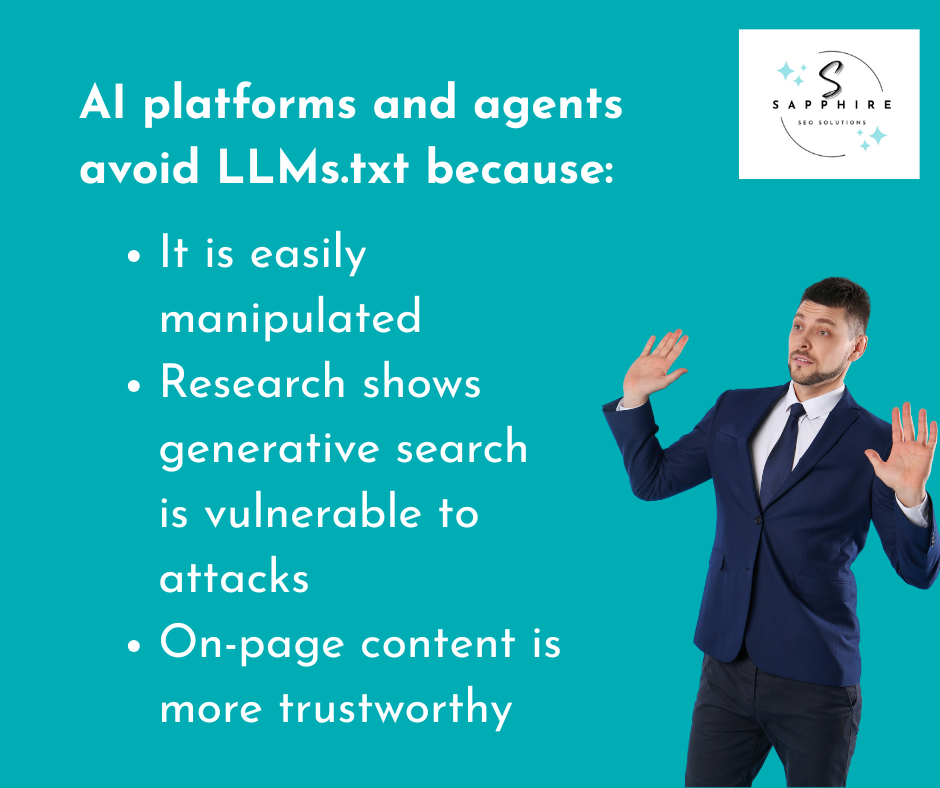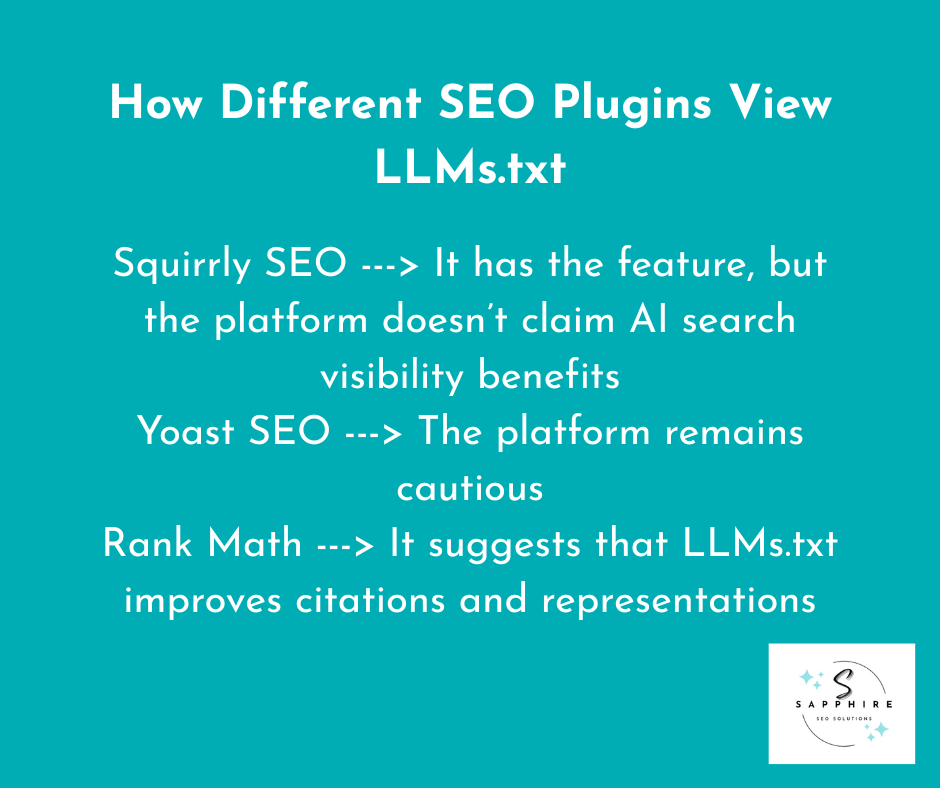LLMs.txt for AI SEO: Does It Boost AI Search Visibility?
LLMs.txt is a proposed standard file and a website crawl and indexing standard. It was said to help AI search engines understand web content more efficiently. Many SEO agencies claimed that this file helps improve AI search visibility. However, recent research shows that it does not boost citations or AI ranking. Also, as of now, no major AI platform uses it, and adoption remains low. For maximum AI search visibility, businesses need to focus on high-quality content, proper structure, and SEO fundamentals.
Key Takeaways
LLMs.txt does not increase AI search visibility or citations.
AI platforms like Google and OpenAI do not rely on LLMs.txt.
Adoption is low; even high-traffic sites rarely implement it.
SEO plugins provide LLMs.txt mainly to meet user demand, not improve AI rankings.
Focus on quality content, site structure, and proper crawl access for AI visibility.
Since late 2024, after the introduction of LLMs.txt, many SEO agencies started claiming that it was detrimental to improving AI search visibility. They said that this standard file was bridging the communication gap between websites and search engines, helping them understand the content better.
LLMs.txt took the center stage after AI-powered results started to become the new norm. Seeing it as an opportunity, businesses began to ride this hype train, quickly adopting this standard file. The idea behind the quick adoption by large companies was that it would help make their site more visible across various search platforms and stay relevant.
However, several recent studies confirmed the opposite. These studies showed that the LLMs.txt file does not impact AI visibility. In fact, it's completely unnecessary since no major AI platform uses it.
So, what is the truth? Should you use it? At Sapphire SEO Solutions, we have been helping small businesses rank higher in traditional search engine results pages since 2007.
With the advent of AI search engines, our experts gained the relevant certifications and stay up-to-date with the latest industry insights, allowing us to offer affordable yet reliable AI SEO services. This ensures that our clients not only rank in traditional search but also can attract AI search engines.
In this article, we will break down the following:
What is LLMs.txt?
Why was LLMs.txt hyped?
What does current research say about LLMs.txt?
How should SEOs think about AI visibility moving forward?
What Is LLMs.txt?
LLMs.txt is nothing more than a proposed standard file. Currently, it's not an adopted file format for websites. So, what does it do?
Heard about "robots.txt"? LLMs.txt was created to complement that. It would provide structured guidance and specially curated content summaries to AI search engines. This would make it easy to parse webpages before even getting to the content.
Simply put, LLMs.txt would help provide summaries to generative engine optimization (GEO) for AI models like:
GPT
Claude
Gemini
Perplexity
So, why was it proposed in the first place?
With the advent of AI Overviews, businesses needed to stand out and attract AI search engines. LLMs.txt would help with that goal by doing the following things:
Provide an AI-friendly list of URLs
Offer organized Markdown summaries of key pages, providing a short summary in an LLM-readable format
Highlight your most important pages
Establish usage permissions, licensing, or restrictions
Create a "preferred interpretation" of your site for LLMs
Seems like an attractive proposition, right? Perhaps this is why people believed in LLMs.txt and its ability to influence how AI search engines parse web pages. Again, the question here is: why was there a need for LLMs.txt?
Simply put, the current standard, which is HTML, is filled with layout codes and other clutter. This affects how AI search engines interpret content. With a clean txt file like LLMs.txt, it would be easier for AI search engines to extract more accurately represented content.
This all sounds good, right? So, should you adopt it?
Not so fast. While LLMs.txt aimed to improve readability for LLMs, the problem is that none of the large AI companies agreed to use this standard. Right now, it's still an unofficial idea, which means it's not a standard, nor is it supported or recognized.
How LLMs.txt Was Supposed to Work
LLMs.txt was on every SEO professional's mind in late 2024. Reputable SEO agencies pushed the idea of adoption forward to business owners, glorifying how it would change their site's fate in the coming days. The result? Quick adoption by large businesses.
LLMs.txt didn't look much different than the existing standards. In fact, it mimicked it in a better way and had similar patterns. Let's break this down for you.
Robots.txt guides crawlers on where they can go, while XML sitemaps tell crawlers what pages are important. On the other hand, schema markup describes content contextually. LLMs.txt fits in perfectly with all of this, as it feels like "the AI version" of these.
Early adopters of LLMs.txt believed that this new "standard" would:
Give AI systems a cleaner interpretation of content
Improve the accuracy of AI-generated summaries
Increase the likelihood of being mentioned in AI answers
Provide site owners with more control over AI usage
Boost visibility in emerging AI search results
The claims circulated faster than wildfire. But there was no evidence that LLMs.txt would work. SEO professionals and businesses felt that this standard was incredibly logical and that AI platforms would want to use it, which is why they hopped on the hype train. Early adoption meant that they would win, helping them surpass their competitors.
What they failed to realize was that even if LLMs.txt felt logical, it didn't mean that AI platforms would adopt it. Due to the fear of missing out (FOMO), SEO professionals and businesses failed to take note of the security and technical implications of adopting this standard file.
Why SEO Agencies Initially Believed LLMs.txt Was Important
There are several reasons why SEO agencies believe that LLMs.txt was the next big thing, leading to quick adoption. They include the following:
It felt familiar to sitemap and robots.txt.
There was a panic that AI overviews would overshadow existing content.
SEO leaders started promoting LLMs.txt and publishing guides.
SEO plugins started providing AI search visibility features, thinking that LLMs.txt is a ranking signal.
There was a fear of missing out among SEO professionals and businesses.
The Reality Check: Current Adoption and Evidence
LLMs.txt became less favorable in recent months. Here's why:
Adoption Is Low and Flat Across All Website Sizes
SE Ranking analyzed around 300,000 domains and found that:
Only 10.13% of websites use LLMs.txt
Adoption is evenly distributed across low, medium, and high-traffic sites
Large websites (100k+ visitors) use it slightly less (only 8.27%)
Since LLMs.txt is not adopted widely, major publishers and AI platforms are not taking it seriously.
No Measurable Impact on AI Citations
After using XGBoost and SHAP analysis to determine whether LLMs.txt predicts how often sites appear in AI results, SE Ranking found the following:
LLMs.txt had zero predictive value
When the variable was removed, the model's accuracy improved
Having LLMs.txt did not increase citations or references in AI answers
Simply put, the single file doesn't impact how AI models surface content. This makes it useless for businesses to adopt.
AI Platforms Do Not Use It
Another major factor that puts a dent in the adoption of LLMs.txt is the fact that AI platforms such as the following do not use it:
Google
OpenAI
Perplexity
Anthropic
Bing AI
Meta
…none of the abovementioned AI platforms have announced support for LLMs.txt. In fact, none of these platforms has even published documentation recommending it, nor have they claimed that their systems read, parse, or rely on it.
And not a single AI engine uses it as a ranking or citation input.
What Google, OpenAI, and Others Say About LLMs.txt
Since most of these AI platforms don't support LLMs.txt, let's quickly go over what some of the largest ones think about this file.
Google's Position
Google says that:
AI Mode and AI Overviews do not use llms.txt files
Google AI relies on the same ranking signals as organic search
LLMs.txt is not necessary
According to Search Engine Journal, John Mueller, who is a Senior Webmaster Trends Analyst and Search Relations team lead at Google, publicly advised SEOs to be skeptical of misleading claims around LLMs.txt.
OpenAI's Position
As of today, OpenAI has only offered guidance around robots.txt. It has not mentioned or released any documents supporting LLMs.txt. Plus, there is no evidence that ChatGPT or its search models rely on the file in any way.
While it's true that the GPTBot sometimes fetches LLMs.txt, there is no indication of reliance or ranking impact.
Perplexity, Anthropic, Meta, Bing
To determine what these AI platforms think of LLMs.txt, it's important to know how they work. Here is how these AI platforms work:
Crawl HTML content
Use existing metadata and structured markup
Do not use curated Markdown files
Avoid inputs that can be easily manipulated
In the above workflow, LLMs.txt doesn't fit into their crawling or ranking ecosystems.
The SEMrush Reddit Controversy That Caused a Lot of Confusion Over Early Adoption
Another platform that created the hype around LLMs.txt was Reddit. One of the users on the SEO subreddit said that an SEO tool, particularly Semrush, highlighted the need for an LLMs.txt file.
Due to this post, it gave others the impression that:
LLMs.txt is required
Missing it could harm AI search visibility
AI systems might "misrepresent" a site without it
To dispel such assumptions, John Mueller categorically stated that LLMs.txt is unnecessary. This shows how quickly SEO automated tools can mislead users, even unintentionally.
Why AI Agents and Platforms Avoid LLMs.txt Completely
So, why do AI agents avoid LLMs.txt? Because of the following reasons:
It Is Easily Manipulated
An LLMs.txt is a file that contains information about a page, giving AI search engines and leading AI companies/platforms more details about it.
Webmasters can use the LLMs.txt file to provide inaccurate details about a page, even if the information doesn't match what the page has to offer. This can lead to several issues, including the following:
Keyword stuffing
Content laundering
Injected prompts
AI-specific manipulation
Fake summaries designed to influence AI rankings
Research Shows That Generative Search Is Vulnerable to Attacks
A 2024 paper on "Adversarial Search Engine Optimization for Large Language Models" demonstrated that:
Bing and Perplexity LLM search could be influenced
Manipulated content increased recommendation likelihood by 2.5×
Large language models are susceptible to prompt injection within web content
LLMs.txt makes manipulation even easier, quickly influencing AI search engines and LLMs.
On-Page Content Is More Trustworthy
Since LLMs.txt can easily manipulate LLMs, AI platforms prefer HTML. This is because:
Users see the same content that crawlers see
It's harder to hide manipulation
It reflects genuine publisher intent
It aligns with search ranking signals
LLMs.txt is also an experimental file, which is another huge reason why AI agents continue to rely on traditional SEO signals.
How SEO Plugins Describe LLMs.txt
Here are a few different SEO plugins and their views on LLMs.txt:
Squirrly SEO
Recently, Squirrly SEO added LLMs.txt because users requested it. However, the platform has already mentioned that it doesn't boost AI search visibility.
Yoast SEO
According to Yoast SEO, LLMs.txt could be a standard in the future. However, the platform remains cautious of its use and doesn't claim any benefits of using LLMs.txt. Yoast SEO also uses conditional wording, such as "can", "could", and "may", when talking about this experimental standard.
Rank Math
While Squirrly SEO and Yoast SEO remain cautious of LLMs.txt, Rank Math does the opposite. It claims that AI chatbots use curated Markdown versions of content, suggesting that LLMs.txt improves citations and representation. However, recent evidence doesn't support Rank Math's claims.
Why the Difference in Claims Across Different Tools
It's all about user demands. If users start requesting particular features, the SEO tools and the company behind them feel pressurized into providing them, even if these features don't provide any real value. This can lead to a lot of confusion.
The LLMs.txt Misinformation Loop
Businesses, after learning about the hype around LLMs.txt, started to worry about AI search visibility. They wanted concrete ways to influence AI search engines, building up serious pressure on SEO tools to provide features.
When different SEO tools started to provide support for LLMs.txt, it implied importance. This led SEO agencies and professionals to believe that this experimental standard was the future, further promoting it and publishing guides. Seeing all of this hype, more businesses started adopting LLMs.txt.
This constant loop of misinformation continues to be fueled by businesses, SEO tools, and leaders in the industry. But there is no evidence that LLMs.txt can boost AI search visibility.
So… Does LLMs.txt Boost AI Search Visibility?
No, and there is data that confirms this. Across 300,000 domains, machine-learning analysis found that LLMs.txt does not:
Increase in AI citations
Improve visibility
Influence ranking
Hold importance for AI platforms, as they don't use it
Should You Add It Anyway?
You can add LLMs.txt to your SEO strategy, but don't expect it to influence results.
LLMs.txt is easy to implement, doesn't have any downsides, and it can future-proof your SEO strategy, especially if AI platforms adopt it in the future. However, there are some drawbacks to adopting LLMs.txt, some of which include the following:
It offers no current visibility benefit
It's not used by AI crawlers
It can distract from efforts that actually matter
It fuels misconceptions
If you choose to add it, treat it as optional. Don't consider LLMs.txt as a strategic add-on. Right now, it's just a proposal at this stage, not a confirmed standard.
Looking to Boost AI Search Visibility? You Can Rely on Sapphire SEO Solutions!
If you want to boost AI search visibility, forget LLMs.txt. Evidence shows no clear citation benefits and no practical impact today.
Some of the most effective strategies for AI visibility include high-quality E-E-A-T online content, clear site structure, accurate schema markup, strong authority signals, reputable backlinks, and strong on-page optimization. Sapphire SEO Solutions can help with all of this.
Our SEO experts are certified in AI search optimization, and we have already helped many businesses improve their AI search visibility. To schedule a free consultation, fill out the online contact us form today.
Are you looking for well-structured AI search-optimized content? Check out the different content writing tiers we have before placing an online order!
Frequently Asked Questions - LLMs.txt for AI SEO
What is LLMs.txt and how does it work?
LLMs.txt is a plain text file designed to improve AI comprehension by providing structured summaries and highlighting important content. It sits in your root directory and works like a sitemap for language models, offering a machine-readable version of your key pages. For example, instead of complex HTML, you provide clean secondary information in a shorter context for faster inference time.
Does LLMs.txt improve AI search visibility?
No. Research analyzing hundreds of thousands of domains found no connection between having this file and AI search visibility or citations. No major AI platform uses it for ranking or citing content, and Google Search Console doesn't track it as a ranking factor.
Should I implement LLMs.txt on my website?
It's optional and mainly about future-proofing. While harmless, it offers no current benefits. Focus instead on creating content with strong content quality, site structure, and crawl accessibility. Make your pages human-readable and develop LLM-friendly content through LLM-friendly documentation that naturally answers questions. But make sure you focus on relevant content that provides valuable information.
Why did SEO agencies recommend LLMs.txt initially?
Early recommendations seemed like a smart move based on assumptions, familiarity with sitemaps and robots.txt, user demand, and fear of AI search invisibility. Many AI tools and plugins added the two files (txt and MD files) before any platform actually adopted them, creating false urgency.
Do AI platforms like Google, OpenAI, and Bing use LLMs.txt?
No. Google relies on traditional SEO signals and Google Search Console data. OpenAI uses robots.txt for crawler access. Bing and Perplexity prefer on-page content and structured markup. Web crawlers process relevant information directly from HTML rather than separate MD files.
How do SEO plugins handle LLMs.txt?
Approaches vary. Squirrly clearly states it doesn't affect AI visibility. Yoast explains it neutrally without promising benefits. Rank Math overstates its usefulness by suggesting AI chatbots use the curated Markdown content, which lacks supporting evidence. LLM crawlers largely ignore these files.
Why is LLMs.txt considered unnecessary by AI experts?
AI platforms prefer on-page HTML content visible to both users and AI. LLMs.txt is easily manipulated, creating spam risks. Better approaches include proper markup, clear shorter context within actual pages, and managing duplicate content. Ensure important pages are accessible through one URL via your standard sitemap with appropriate link titles and URLs provided for efficient inference time.
What format should the LLMs.txt file content be in?
Content uses Markdown text designed to be human-readable and machine-readable, providing short summaries in plain text format. For example, you'd create LLM-friendly documentation with secondary information instead of complex HTML. However, since no AI platform currently uses this file, if you want to dive deeper, focus on optimizing your actual pages rather than separate MD files.








